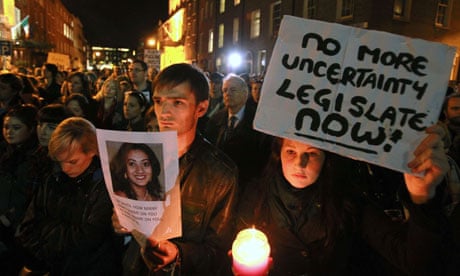In a move unthinkable even a few years ago, the Irish governmentis to introduce legislation permitting abortions in limited circumstances.
The decision follows pressure from the European court of human rights, which ruled that abortions should be allowed in the republic in cases where a woman's life was at risk.
The taoiseach, Enda Kenny, who represents one of the most traditional rural Catholic constituencies in Ireland, said the Fine Gael-Labour coalition would proceed with a mixture of "legislation with regulation".
The measures would be based on proposals from the so-called Expert Group. The reforms are expected to allow terminations where there is a medical risk to a woman's life or when she is thought to be in danger of killing herself. It is unclear whether the law will allow for terminations in cases of rape or sexual abuse.
In 1992 the Irish supreme court ruled in the case of a 14-year-old girl made pregnant through rape that abortion could be a legal option to someone who was suicidal. Successive Irish governments have failed to implement the ruling, mainly out of fear of upsetting the Catholic hierarchy and religious rightwing pressure groups.
The abortion ban came into international focus last month after an Indian woman, Savita Halappanavar, died in Galway university hospital during a miscarriage after she and her husband had repeatedly asked for a termination of her 19-week-old pregnancy. Her husband, Praveen, alleged that medical staff told them "this is a Catholic country" and that they would not carry out the termination.
The Expert Group recommended that legislation plus regulation would fulfil the requirements of the European convention on human rights and the judgment of the European court in the case of three women who claimed their human rights including the right to life had been put in danger by the abortion ban.
Kenny ruled out a free vote among members of the Dail to pass the legislation. That decision is likely to cause problems within Kenny's Fine Gael party, as 12 Dail deputies have opposed introducing abortion on the grounds of mothers being suicidal.
Anti-abortion groups such as Youth Defence have targeted Fine Gael TDs particularly in rural areas, promising to picket their constituency offices if they break their promise not to introduce abortion in Ireland.
Speaking after the Irish cabinet discussed the issue, the health minister, James Reilly, said he was very conscious of the sensitivities around the issue. "I know that most people have personal views on this matter. However, the government is committed to ensuring that the safety of pregnant women in Ireland is maintained and strengthened," he said.
"We must fulfil our duty of care towards them. For that purpose we will clarify in legislation and regulation what is available by way of treatment to a woman when a pregnancy gives rise to a threat to a woman's life. We will also clarify what is legal for the professionals who must provide that care while at all times taking full account of the equal right to life of the unborn child."
